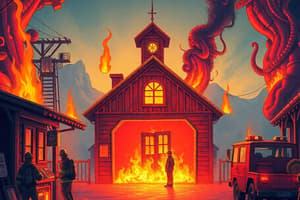Podcast
Questions and Answers
Who has the authority to enter buildings and premises to investigate fire hazards?
Who has the authority to enter buildings and premises to investigate fire hazards?
- The mayor
- The building inspector
- The city council
- The marshal or the head of the fire department (correct)
Under what condition must the marshal or the head of the fire department investigate a building or premises?
Under what condition must the marshal or the head of the fire department investigate a building or premises?
- When a fire has already occurred
- Only if there is visible smoke
- Upon receiving a complaint from a person having an interest in any building or adjacent property (correct)
- Upon request from the mayor
What must be done if fire hazards are found during the investigation?
What must be done if fire hazards are found during the investigation?
- The building must be evacuated immediately
- The hazards must be reported to the police department
- The building must be closed until further notice
- The hazards must be ordered to be remedied in writing (correct)
What types of materials are mentioned as combustible rubbish?
What types of materials are mentioned as combustible rubbish?
How should the notice of order to remedy fire hazards be served?
How should the notice of order to remedy fire hazards be served?
What happens if the order to remedy fire hazards is not complied with within twenty-four hours?
What happens if the order to remedy fire hazards is not complied with within twenty-four hours?
Who bears the expense of removing fire hazards if the order is not complied with?
Who bears the expense of removing fire hazards if the order is not complied with?
What is the primary role of the marshal or head of the fire department regarding fire hazards?
What is the primary role of the marshal or head of the fire department regarding fire hazards?
What happens to the debt incurred from the removal of fire hazards?
What happens to the debt incurred from the removal of fire hazards?
Who is responsible for collecting the debt for removal or abatement of fire hazards?
Who is responsible for collecting the debt for removal or abatement of fire hazards?
Who receives the amounts collected by the collector of taxes in the case of debts due to the commonwealth?
Who receives the amounts collected by the collector of taxes in the case of debts due to the commonwealth?
What is the penalty for an owner or occupant who fails to comply with the fire hazard order?
What is the penalty for an owner or occupant who fails to comply with the fire hazard order?
Who may delegate authority in writing to enter and investigate buildings and premises for fire hazards?
Who may delegate authority in writing to enter and investigate buildings and premises for fire hazards?
Which term is included under 'premises' for the purposes of this section?
Which term is included under 'premises' for the purposes of this section?
What must be done with the account for expenses incurred in removing fire hazards?
What must be done with the account for expenses incurred in removing fire hazards?
What is considered a fire menace or obstacle to easy ingress or egress?
What is considered a fire menace or obstacle to easy ingress or egress?
Who serves the notice of the fire hazard order?
Who serves the notice of the fire hazard order?
What must be done if combustible rubbish is found during the investigation?
What must be done if combustible rubbish is found during the investigation?
Flashcards are hidden until you start studying
Study Notes
Authority and Procedure for Fire Hazard Investigation
- The marshal or head of the fire department has the authority to enter buildings and premises to investigate fire hazards.
- Investigations must be conducted upon receiving a complaint from those with an interest in the property.
Remediation of Fire Hazards
- If fire hazards are identified, a written order must be issued to remedy the conditions.
- Combustible rubbish includes waste paper, rags, cardboard, string, and packing material.
Notification and Compliance
- Notices regarding fire hazards should be served by a member of the fire or police department.
- Failure to comply with the order within twenty-four hours allows for the removal of hazards at the property owner's expense.
Financial Responsibility and Debt Collection
- The owner or occupant is responsible for expenses incurred in the removal of fire hazards.
- Debt for removal costs becomes a liability to the city or commonwealth and is collected by the tax collector.
Penalties for Non-Compliance
- Owners or occupants failing to comply face a fine of up to fifty dollars for each consecutive forty-eight hours of non-compliance.
- The marshal or head of the fire department can delegate authority for inspections and can act in place of the mayor concerning liens and claims.
Definitions and Scope
- "Premises" includes buildings and adjacent alleys and not just the building itself.
- Fire menaces include the accumulation of combustible rubbish and can obstruct ingress or egress.
Compliance Outcomes
- If the order to remedy fire hazards is followed within twenty-four hours, no further action is taken against the owner.
- Tax collectors play a crucial role in collecting debts related to fire hazard removal, ensuring payment to the treasurer of the commonwealth.
Studying That Suits You
Use AI to generate personalized quizzes and flashcards to suit your learning preferences.




